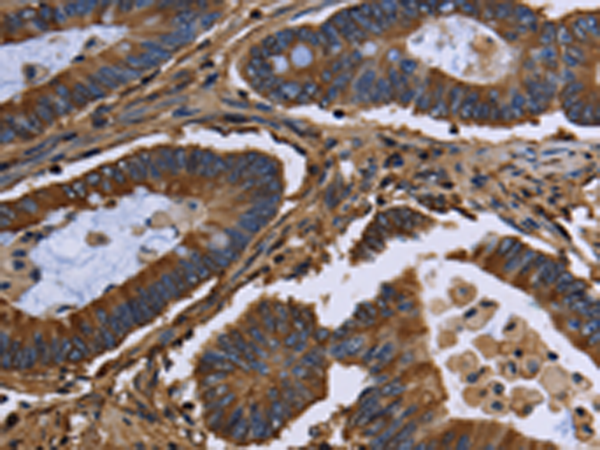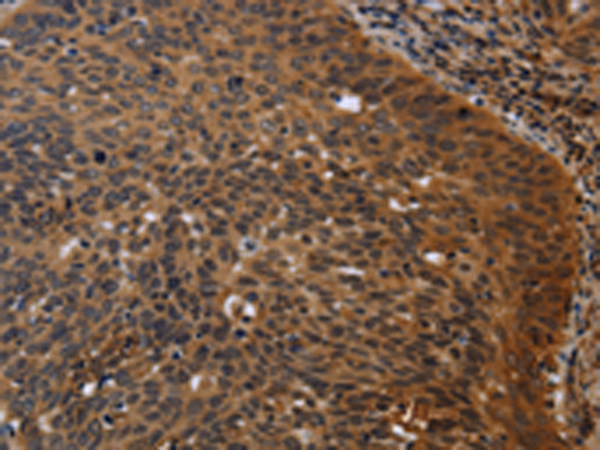


| WB | 咨询技术 | Human,Mouse,Rat |
| IF | 咨询技术 | Human,Mouse,Rat |
| IHC | 1/50-1/200 | Human,Mouse,Rat |
| ICC | 技术咨询 | Human,Mouse,Rat |
| FCM | 咨询技术 | Human,Mouse,Rat |
| Elisa | 1/2000-1/10000 | Human,Mouse,Rat |
| Aliases | HEL-S-78p |
| WB Predicted band size | 56 kDa |
| Host/Isotype | Rabbit IgG |
| Antibody Type | Primary antibody |
| Storage | Store at 4°C short term. Aliquot and store at -20°C long term. Avoid freeze/thaw cycles. |
| Species Reactivity | Human, Mouse, Rat |
| Immunogen | Fusion protein of human FGB |
| Formulation | Purified antibody in PBS with 0.05% sodium azide and 50% glycerol. |
+ +
以下是3篇与FGB抗体相关的文献摘要概览,供参考:
---
1. **标题**: *Autoantibodies targeting fibrinogen-like protein 2 in COVID-19 patients with neuropsychiatric symptoms*
**作者**: Zhang Q. et al. (2022)
**摘要**: 研究发现COVID-19患者中部分出现神经精神症状的个体血清中存在抗FGB(纤维蛋白原β链)的自身抗体,提示其可能与血脑屏障破坏及神经炎症相关,为探索FGB抗体在病毒感染后并发症中的作用提供了依据。
---
2. **标题**: *Fibrinogen beta chain antibody promotes hepatocellular carcinoma metastasis via TGF-β signaling*
**作者**: Chen L. et al. (2019)
**摘要**: 该研究通过体外实验证实,抗FGB抗体可通过激活TGF-β通路增强肝癌细胞侵袭和转移能力,揭示了FGB抗体在肿瘤微环境中促进癌症进展的潜在机制。
---
3. **标题**: *Anti-fibrinogen autoantibodies in antiphospholipid syndrome: Clinical and experimental insights*
**作者**: Müller-Calleja N. et al. (2017)
**摘要**: 研究报道抗磷脂综合征(APS)患者中存在高水平的抗FGB自身抗体,实验显示这些抗体可诱导血栓形成和补体激活,提示其作为APS血栓事件的生物标志物和治疗靶点潜力。
---
注:以上文献为示例性内容,实际引用时建议通过PubMed或Web of Science等数据库核对原文信息。如需具体文献链接或补充更多研究,可提供进一步说明。
Fibrinogen beta chain (FGB) antibodies are immunological tools designed to target the beta subunit of fibrinogen, a critical plasma glycoprotein involved in blood coagulation and wound healing. Fibrinogen, composed of two sets of three polypeptide chains (Aα, Bβ, and γ), is synthesized primarily in the liver and circulates in the bloodstream. Upon vascular injury, thrombin cleaves fibrinogen to form fibrin monomers, which polymerize into a clot matrix, stabilizing platelet aggregates and preventing excessive bleeding. The FGB chain plays a key role in fibrinopeptide B release during this process.
FGB antibodies are widely used in research and diagnostics to study fibrinogen structure, function, and expression. They aid in detecting fibrinogen levels in conditions like dysfibrinogenemia, liver disease, or disseminated intravascular coagulation (DIC). Additionally, these antibodies help investigate fibrinogen's role in inflammation, thrombosis, and tumor progression, as elevated fibrinogen is linked to cardiovascular diseases and cancer metastasis.
Commercial FGB antibodies are developed using recombinant FGB proteins or synthetic peptides, validated for specificity in assays like ELISA, Western blot, and immunohistochemistry. Challenges include cross-reactivity with homologous proteins or degraded fibrinogen fragments. Ongoing research focuses on refining antibody specificity and exploring therapeutic applications, such as targeting fibrinogen in thrombotic disorders. Understanding FGB biology through these antibodies remains vital for advancing hematology and vascular medicine.
×